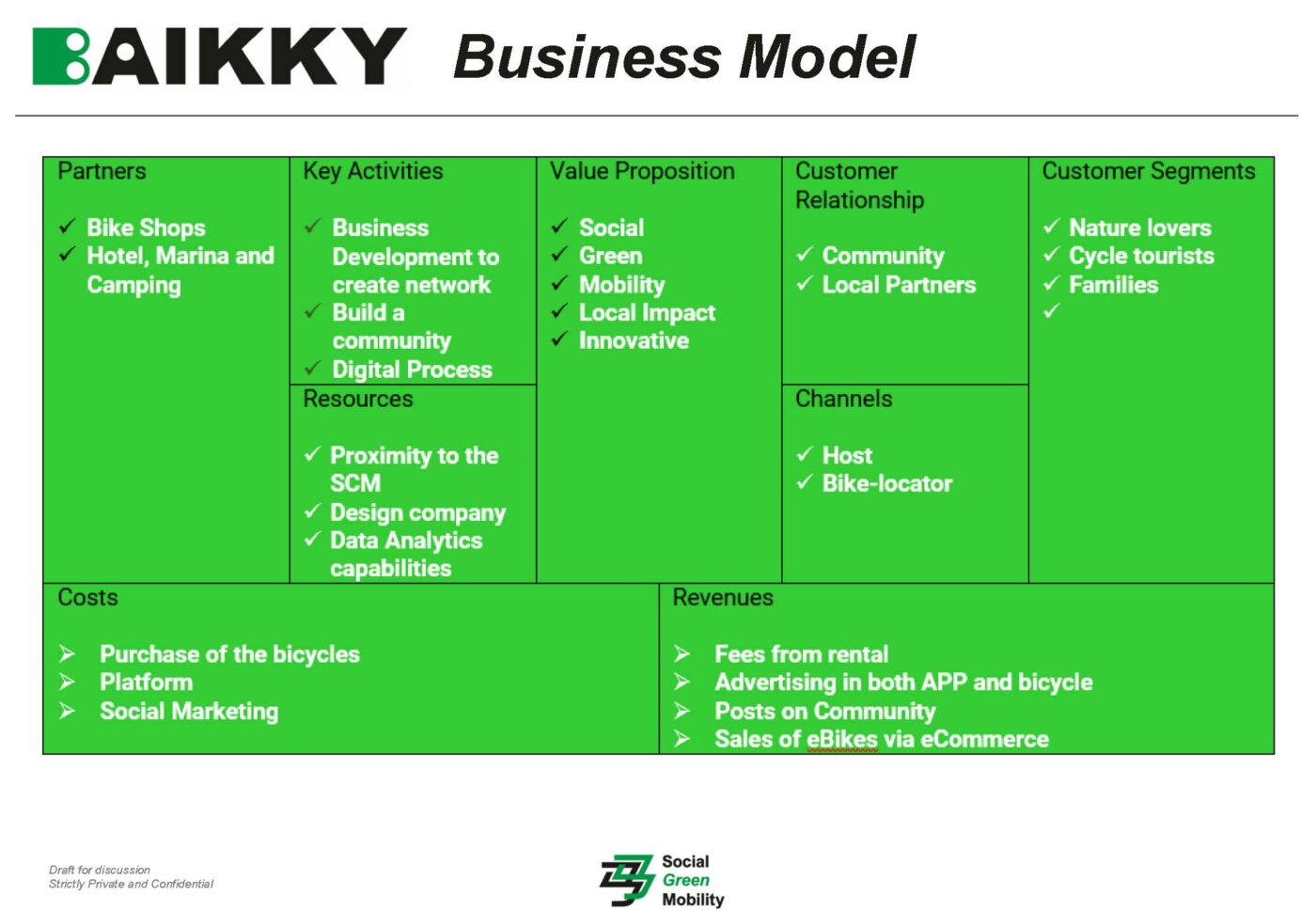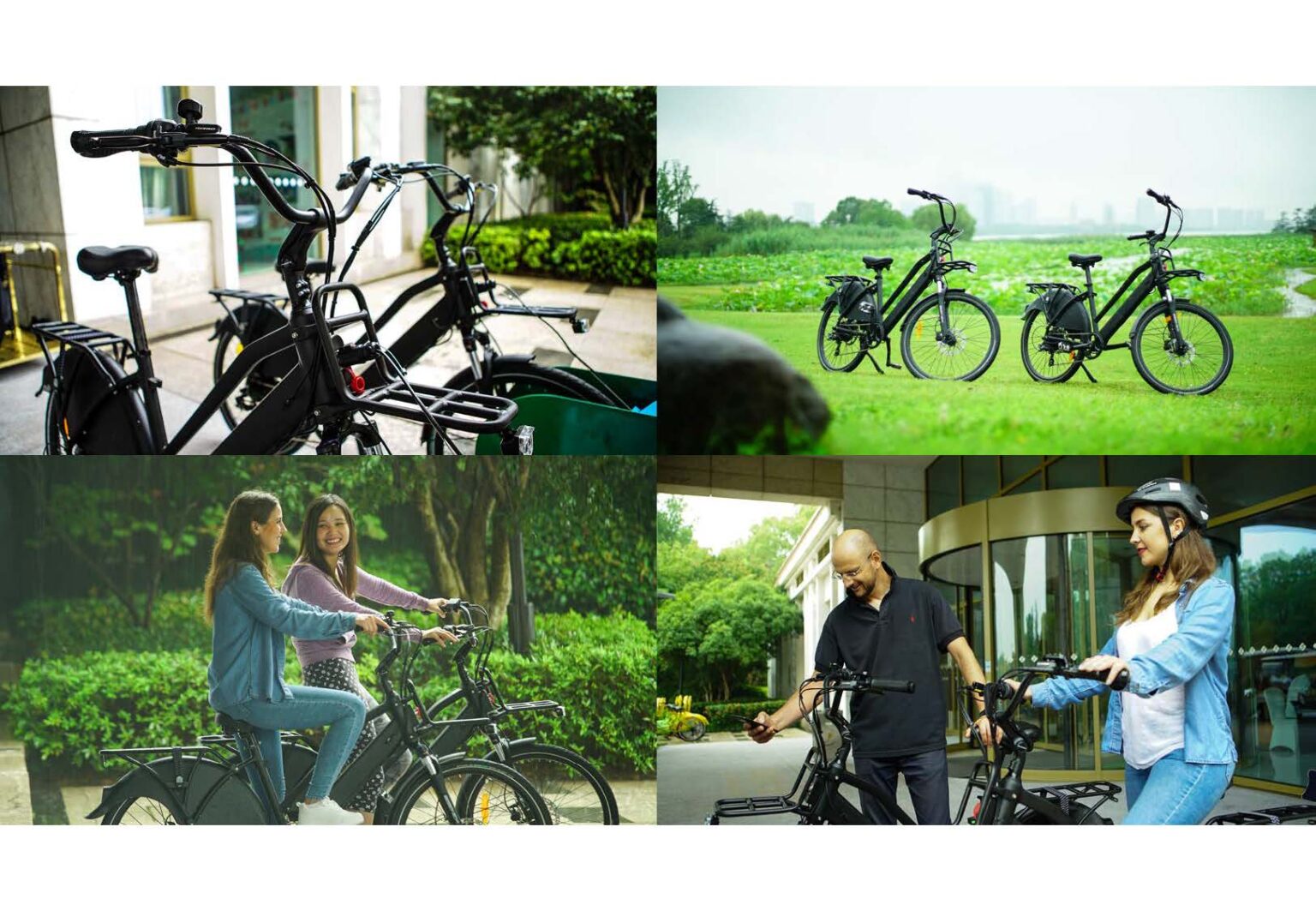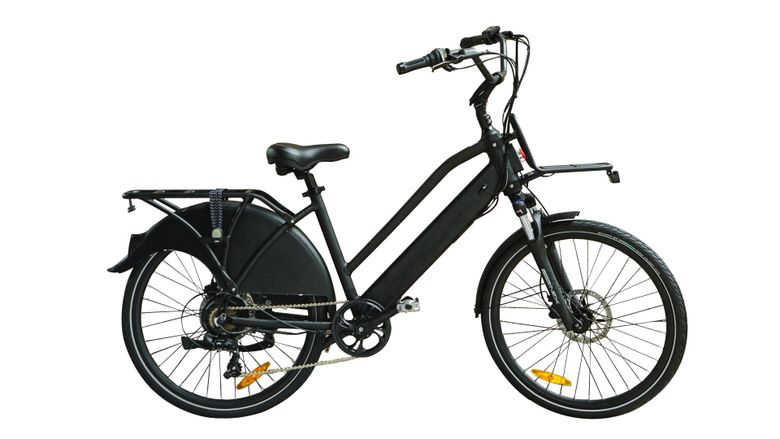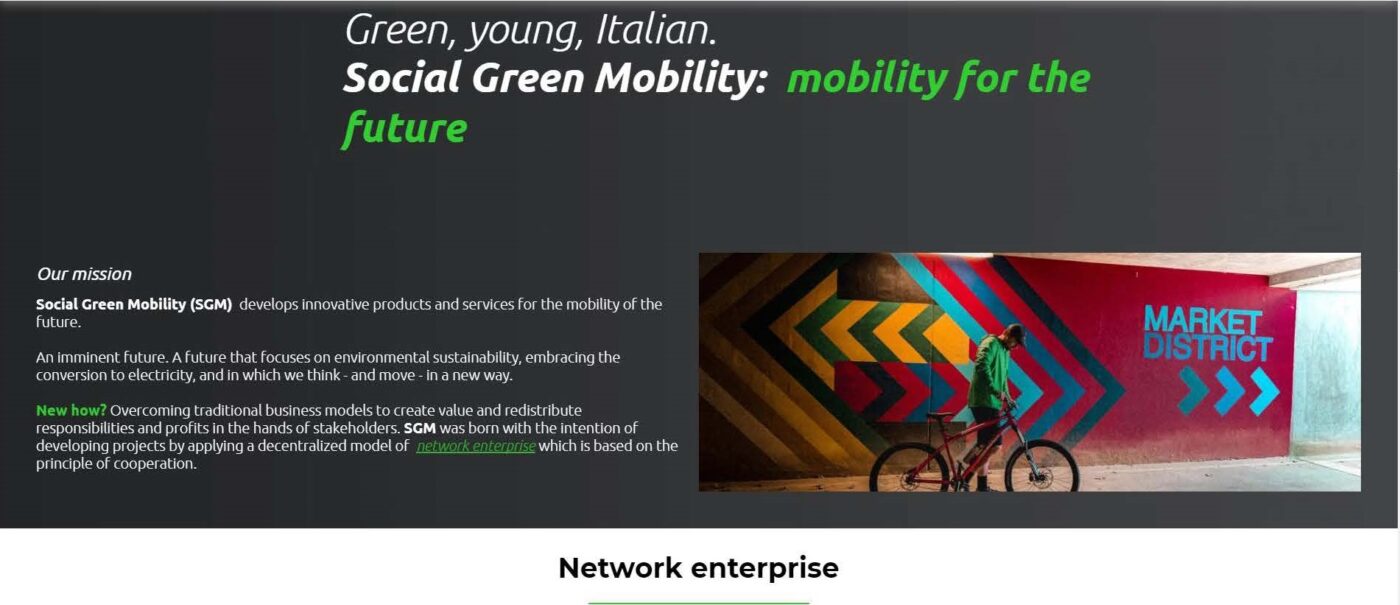Social Green Mobility SGM is an Italian company recognized as an innovative Start-up, born to design, develop and integrate cutting-edge mobility services. The mission of the company is to develop sustainable and inclusive services, giving rise to a new way of socializing, while promoting the incredible amount of resources displaced over Italy.
Script of Interview
Interviewee Mr. Riccardo Campanile (RC)
Position Co-Founder and Chairman
Company name Social Green Mobility (SGM)
Company website URL https://socialgreenmobility.com
Interviewer John D. Evans, CFA (JE)
Interview conducted on 16th April 2021
About Riccardo Campanile
JE: Okay, good afternoon to the viewers of Venture Watch. It’s a pleasure to have today, a conversation with Mr. Ricardo Campanile, who is the founder and president of Social Green Mobility, a company founded and registered in Italy. And he is going to be talking today a bit about himself, about the company, the industry that Social Green Mobility is involved with. And then we’ll close off with a little bit of a discussion about industry structure in northern Italy. So, it should prove to be very interesting. So welcome, Ricardo. Nice to have you.
RC: Nice to meet you all. Thank you, John. This is Ricardo Campanile. I’m Italian and I grew up in Italy, where I studied mechanical thermo technical and then engineering. And then I started my job career in Italy. And 13 years ago, I moved to China for a new adventure in China. I’ve been working for some French and German multinational companies. And recently in China, I founded a company on behalf of the Italian headquarters and run it up to last year. What else about myself, I am quite experienced about industrial goods. Actually, most of my most of my job career has been developing that business. So, this is the my, let’s say, personal overview. Now I am back in Italy due to personal and family reason and due to the fact that traveling between Italy and China is not easy, as it was. So, until the situation is the current one, I will stay in Italy, where I care about Social Green Mobility.
JE: Okay, now just tell us what city do you live in? And is that the same city that the Social Green Mobility is registered in?
RC: Actually, no, I’m living in Savona on the seaside in Liguria close to France. But the Social Green Mobility has been registered in Milan since Milan is more business oriented than Savona. In Savona, we will develop some operations of Social Green Mobility, but the company has been founded in and registered in Milan.
JE: Okay, so where you’re living is I’m guessing about a two-hour drive sort of south west from Milan. Is that correct?
RC: Even less. If you respect the speed limitation, yes, let’s say two-hour drive.
About Social Green Mobility
JE: We always respect the speed limitation, don’t we? Perfect. Okay, let’s talk a little bit about this company, Social Green Mobility. Tell us what it is, how it came about, and what your role is, as Co-Founder and Chairman.

RC: Social Green Mobility is a project, let’s say it’s a startup but there. Actually, we started to think about this kind of services company some years ago, looking at the development of the electric mobility, particularly in China, where I was living at the time. And with some other colleagues, some other partners and friends, we decided to launch this kind of company. In the very beginning, we were just thinking about selling bicycles, then we saw that it was not an interesting business; it was not innovative, is not sustainable. So, we decided to change completely our goal and our business scope. Social Green Mobility is a company which aims to provide services, not product. So, the company provides bicycles to touristic structures, touristic organizations like hotel, resort, camping, marinas, and we provide those bicycles in the consignment stock, let’s say without charging anything to the touristic organization. The hotel for instance, can be whatever it is, can provide this service to its guests or even to tourists through an APP we have developed by ourselves. They can rent the bike and they can open the locker and take the bike. It’s not just mobility, but it’s Italy and that’s why we start this business, Italy is a typical touristic destination. Many tourists, not only Italian ones, but also from other countries of Europe and not only, they come to Italy to enjoy the landscape and whatever it is beautiful in Italy to see. So, our goal is to provide something to visit, to enjoy our country. It means that the host or the guests of the hotel can rent the bike and very easily, actually, via an APP, you will pay through the APP and we take the bike and the bike will be brought later back to the same hotel. So, it’s not a sharing bike, we totally do not follow that kind of business model. The bicycle will be rented and will be returned in the same place. The APP will provide all the all the information that might be useful to the to the driver, to the rider, about an interesting Museum, like a restaurant or whatever it is, it is worth to visit. So, it’s an experience and so our aim is also to create a kind of community where the people using our bikes will enrich this information and put in them and setting them available to any other user. So, the customer, the final customer, is the tourist. We provide these kinds of services up through, let’s say, kind of supply chain where there is Social Green Mobility. We’re going to import components, then in Italy, where the bicycle will be assembled by Service Center, which will be also in charge to install the bicycle and the charging station in the in the chosen host organization and then provide the maintenance. The hotel or whatever it is we call it ‘host’. They also will put the bicycle available to their guests, also to the tourist I as I said before, and then we share the revenues. So Social Green Mobility, the host and the service center, we share the revenues paid by the customer. So, as you can see now.
JE: Yeah, I’m just going to clarify one thing. So, I’ve seen the pictures. It looks like a bicycle, but it’s electrically powered, as opposed to being a pedal bike on it, but it’s but it’s not like the E-scooters that that populate China, which are sort of like a small or little Vespa that are electrically charged. So, you’ve gone with the bicycle frame, but it’s electrically powered.

RC: That’s the that’s the reason we chose the electrical bicycle because Italy is not a flatland like could be Shanghai or Suzhou where I’ve been living for many years. Actually, in those areas, electricity, the electric mobility is just to cover many, many kilometers. Actually, in Italy, we have downhill, uphill, so it’s a quite demanding territory for the bike for the normal rider, let’s say. So, we chose definitely the electric bike because it can provide a long range, so you rent the electric bicycle, you can go almost everywhere. And then you can cover even more, many kilometers without any effort. We design that bicycle in order to let it be suitable for any kind of person from a, let’s say, a young guy up to an older one. No, there is no gender structure. I mean, the bicycle is really designed to be user friendly to anyone. That’s why we chose the electric bicycle. Actually, you can use a normal bicycle just in cities like Milan or in the say Pianura Padana, where the where the land is definitely flat, but actually, for instance, in my region, and actually wherever we go, Italy is quite, quite challenging for normal people. Our goal is not to provide bicycle to say, specialist or sport, just a tourist. And the target is to provide a mobility, sustainable mobility way to let the tourists visit the area where they are.
JE: But it’s not just the physical bicycle, you’re also providing sort of logistics through an APP to find so people can find locations and other things. Sort of like, I don’t know, like a search engine or GPS or things. What is that supplementary electronics that are being used?
RC: Actually, IoT is the Internet of Things and is included in our service because the bicycle contains one GPS tracker, which not only can provide information about our assets, because definitely the bicycle belongs to Social Green Mobility, but being traceable, it means that any customer can enrich the tool, can enrich the platform, through their own experiences. It means that the further customer will enjoy the same route joined by the former one. So, it’s a kind of enriching, experiencing platform, not only for restaurant and small restaurants, but also museums and any kind of place which deserves a visit. So, it’s not only providing bicycle, but also providing touristic information, any kind of touristic information.
JE: Okay, very interesting. So, tell us about the people, yourself and the other key persons who were running this business. It looks like there’s four principals on your website.
RC: Actually, we founded this company as four persons. Three of us were living in China, now just two, I don’t know whether I can mention their name. If I can, it’s up to you, though. Okay, that’s that doesn’t matter, I guess. Anyway, both of us are quite experienced managers and there is also a professor of university in the team. And the only one partner that was in Italy is a person quite experienced in and about startups, which because we need the support of someone already experienced in managing a startup. Let’s say that, since we have different skills, we divided the role according to our experiences. We have a specialist about the technicalities because he has been working for many, many years in the two wheels business. As mentioned, we have the person in Italy with able to manage the relationship with the government, with the institution, with the crowdfunding association and the companies. And then me as a business development and the professor as an expert, an architect about the web platform. This is a very important role because actually, most of the service is based on the web. The bicycle is just a something, it’s important because it’s based on the bicycle but it’s just a bicycle.
JE: Okay, let’s look at those two components separately, the bicycle and the technology that’s behind the bicycle. You said that the components, I believe, either some are all manufactured in China, but the components were shipped to Italy and assembled in Italy. So, do all the components come from China? Who are your major suppliers in China, and where are your assembly plants located in Italy?

RC: Well, yeah, currently, even though we would like to buy something in Italy, we are buying everything in China, where we designed, by ourselves, the frame of the bicycle itself in order to fulfill our requirements in terms of safety, in terms of not only safety of the people but also about the security about the battery, which is the most expensive stuff on board. And then we bought everything, then we have an agreement, we signed an agreement with one supplier who is the one who made the frame on our commitment or according to our commitment, and he provides also all the other parts. This partner is not only a supplier but is also a partner because when we had the first increase of capital, he believed in the project and he became a partner, not only a supplier. So, we have a very good and strong relationship with this Chinese partner. All the other parts, less the frame, are, let’s say commercial parts: wheels, gear, brake, handlebar, saddle, whatever, you can buy in the market. The role of this Chinese partner is to collect what we need, what we want, and then to move these components to Italy where we will assemble, not in our own facility, but through the service center. Service center is a part of the network, let’s say it’s a part of the blockchain. We import the goods in Italy, then we distribute the parts to the service center, by now we have just two service centers enabled to do that job because we are still in a testing phase. These two- service partners will assemble the bicycle according to the procedure we gave to them and then we will move we will send the bicycle sets to the host. So, the service partner is a key component of the blockchain or the supply chain, or value chain whatever it is, of the service we are going to provide. So, we have none of our own facility where we install and assemble the bicycle. We try to be close as much as possible, close to the customers, and the customer is the tourists, in order to provide to them not only the bicycle, but also the maintenance service, which is a must.
JE: And then the second part, the technology, the APP, was that developed in house or out-of- house and how is that being generated?
RC: Yeah, actually, we have an agreement with a company, it’s a software-based company based in Shanghai, Paris and London where actually the partners are freelancers. The name is Coderbunker, and you can hire them according to your needs, actually, we develop the platform, database by ourselves. So once everything was clear, we move this database to this this company, Coderbunker, and then you can rent the software developer according to your needs. So, if you need 20 hours of specialists, a special web designer, you will rent for 20 hours. We chose this company because it’s very reliable. It’s not cheap, but at least you can pay, you can manage them and you can pay according to your needs. So, and then also the presence in Europe in the UK and in China, can get a good reliability of the service itself. So, mainly we have two big parts one is for the for the say the hardware, for the bicycle, the components of bicycle and the other one in Shanghai you know, because the architect of the of the platform is in China, our partner and so, two main suppliers, Coderbunker and the company providing the components.
JE: Okay, interesting. Now, I know you mentioned that your supplier provided some initial financing. Were there other external sources of financing beyond the four principles in the company?
RC: Actually, when we founded the company, personally speaking, I was not that confident about the success of this company. But actually when we launched the first increase of capital, we raised 120,000 euro just in less than one month, through just word of mouth, through friends or other friends of friends and finally also the supplier. So, we already increased the capital because we would like to get also the support for the Italian institutions. In Italy there is an institution called in Invitalia which aims to support the startup and innovative startups. Moreover, once we finished this application with Invitalia, just today we had the first interview with the specialist in charge to approve or not approve our project. Later on we are going to launch a crowdfunding campaign and we are preparing all the documents all the movies and whatever it is, it is better to launch a crowd funding.
JE: For my information, what date was the company established?
RC: The company has been established last year, in brief I don’t remember exactly the date in last year in September, I would say.
JE: September 2020. Okay, so you’re still developing it, developing customers. When do you think you’ll start the commercialization aspect and start to generate revenue?
RC: Okay, actually, we have just cleared customs of the first container. We imported components to assemble 60 bicycle and then these 60 bicycles are just a few ones, but we need them to test everything, the APP the GPS and also all the supply chain, the value chain through the service center and the host. We already have the host available to provide, host our bicycle and provide service to their customers. We will do it in different cities where we are close to our service center. We have a service center in my own town, Savona, and another one in center of Italy and Adriatic Sea at the Adriatic seaside. That’s why we will start just as a test phase to check whether everything is in the running because you know everything is new, the APP and their GPS data and data and that’s all we prefer to test everything and then we will start with the massive production of bicycle by one side and providing the right services to the other side. We do hope to be ready for, for let’s say a launch, a real launch of the of the services at the end of this summer. Not before because unfortunately the timing to collect bicycle components and then the shipment that requires quite a long time. Now the market is booming so everyone wants bicycles and the delivery time of the components is increasing by one side. By the other side and not only the transportation cost is increasing but also it’s not that easy to find container from China to Italy so we have to be realistic and pragmatic. We do not count to have everything ready before August or September 2021.
JE: Okay, now I guess except for the very south of Italy, say Sicily, the winters in central or northern Italy probably don’t allow you to ride these bikes. So, this is a seasonal business based upon really sort of the tourist season is that correct?
RC: That’s correct, but not 100% because actually in our plan is also to provide bicycle to hotels for instance in Milan or in other cities I must say other touristic cities like Florence like Verona, where the season, the touristic season is not so fixed. Of course, if you think about south of Italy, Sicily, Sardinians, Pozzuoli, whatever you can provide this a bicycle almost seven, eight months a year, but for
the hotel in the main city, there is no limit.
JE: Okay. Is there a market outside of tourists? I mean, is this something people might be using to go to work or go to university or something like that?
RC: Let’s say that that kind of service is more suitable for sharing bike. Sharing bike, we mean, you take the bike and you leave the bike wherever you want. This is not our business model, because you pay by hour. And if you take your bike to go to work, and you come back eight hours later, it doesn’t work. It does not work.
JE: Okay, so this is very much focused on the tourists coming to Italy. Okay. I mean, in terms of any other support for the company or its production. I know, in Suzhou where you used to live, where I live, the government was sometimes supportive of new manufacturing initiatives. I guess, European countries, sometimes may have subsidies to help new startups. Was there any sort of other government or third-party support for this or is it 100% privately funded?
RC: Actually, no, as you mentioned before, as it is even more than what can happen in China, for instance, where social Green mobility and open it some Chinese branch, which is named the Suzhou Aibilu Industrial Design. So, we have also company based in Suzhou, but actually in Italy, as I mentioned before, there is this kind of institution, which name is Invitalia, which is in charge to support innovative startups. which must be reliable, credible, but they can give you money. Of course, it’s not an equity, so, we have to return back after some years, but it’s a kind of important support. Okay, by the other side in China, is it much easier to be a very small company, like our branch in China is, because VAT is just 1%. corporate income tax is 2.5%, which looks like ridiculous, but it works because it’s improving. Say, for sure, encouraging the initiative of, of the young entrepreneur.
JE: Okay, very interesting. I’ve been here almost 10 years now, I forgot what European VAT rates were like.
RC: Better not to mention.
About the Industry
JE: Let’s, go on to the third section and talk about the industry. Now, my first question for you is what industry category, I know perhaps it straddles a few, but what industry category does Social Green Mobility fall into? Is it sort of an electric vehicle, an E-bike, a technology, how do you categorize it?
RC: Ah, I have to categorize it is a service company, because we do not sell products. We have actually, we have in our business plan, a minority, for seeing the possibility to sell bicycles, but mainly to give our service center something more to do, because the service center according the Baikky project, because Social Green Mobility has two branches. One is Baikky, which is the business I just described right now. The other one is LocaXY, which is the service providing tracking through GPS. Let’s say that both the businesses are handled by the service center, which as at least the ones we are talking right now, they would like to have some bicycle to sell by themselves. So, our secondary business is to import parts to assemble bicycle and to sell them but this is let’s say it’s not our business core. Our business core is to provide services through added value technology because we the APP belongs to us, the website and the IoT and whatever it is, but finally we provide services we do not provide products in fact.
JE: So, in your in your first stage of commercialization, will the focus be strictly on Italy? Or are you looking at any other geographic areas as well?
RC: We are going to start with Italy but since for instance, Cote Azur is quite close to Italy, we will also expand our business to the close-France because you know my region is at the border with France and we have friends there so we can also expand our business in that area. Of course, we are not thinking to expand in France or Germany whatever, not by now actually, because we focus on tourist and tourism is well quite well developed in Italy, South of France, and in future wherever it is, but no limitation. Actually, we just we got some requests from Thailand where we have some friends managing a resort or let’s say, touristic area and they would like to have this bicycle to provide the service to the customer. The advantage to the host is that they don’t have to pay anything, they just have to give us a small area where to place the bicycle and the charging station to finish. They just have to provide some electricity to recharge the battery but no investment is required. So, it’s quite interesting too because actually they can provide an added value service to their customer with good bicycle designed to be strong and reliable without paying anything finally. So, no investment is required. In this sense we are a typical service company.
JE: I mean when you’ve been talking about customers so far, I think you’ve almost exclusively mentioned hotels, I mean are they sort of the prime customer or are there other different types of customer segments?
RC: Actually, if I mentioned customer is hotel, I made a mistake because actually the hotel is a kind of partner of the blockchain The only one customer is the one who is renting the bicycle in the hotel in the resort, in the camping, in the marina, in wherever he wants, but this is the customer. All the other all the other partners, are let’s say supplier if you want not customers. Of course, we have bed and breakfast, we have marinas, we have this small port, the big port, wherever people are coming that might be the need of a bicycle
JE: Okay. So, any entity that has contact with tourists.
RC: Yes, also for instance, the small cities and small village which do not have the intention to invest in sharing bicycle or something like that, they might be our customers but basically we do not manage sharing bicycles. We rent a bicycle which has to be returned to the starting point.
JE: Okay, who, if any are your direct competitors in Italy? Or is there a direct competitor established yet and I don’t include bike sharing as a competitor?
RC: Excluding bike sharing, we in Italy, we have no competitors. There are some, many actually shops, typical bike shop, we’re going to rent the bike but it’s not an organized business. Through our APP, wherever you go in Italy, you’ll be able to find a Baikky shop or a Baikky host where you can rent our bike. So, it means that you don’t have to load your bicycle on your car you just go there and you will find the bike. You can book it, you can pay it you will be sure that the bicycle is there. Actually, nowadays according to our business model, we have no competitors in Italy. There are some other similar organizations like that one in the north of Europe, but the business scope is slightly different.
JE: Okay. Does a tourist need to have any sort of license to rent these bikes or is it just like a pedal bike?
RC: This is a good point because before you mentioned the scooter. Many, many friends and investor asked, what why no scooter? Because the scooter in Italy and in Europe are quite, let’s say, not easy to be managed because you need the driving license for instance to drive a scooter. Instead, we want to have our goal to rent our bike to a family and of course young guys cannot have the driving license. And in any case, we do not want to put any limitation to our customers. So, bicycle is the electric bicycle, respecting the European rules, is the most suitable and easy way to take a ride and enjoy your tour. Scooter is quite complicated, you need the helmet, you need the driving license, insurance, it’s totally another world. It’s clear to you, when you rent a car how many papers you have to fill because driving license, this data, it’s much more difficult let’s say. We want to be easy.
JE: I think you found a unique arbitrage because in terms of the simple utility provided to the rider, if you’re riding an electric bike, or electric scooter, they’re delivering the same service. But of course, by going the bike route, you avoid all the regulation and the hassles, so that’s quite an ingenious way to make it much more widely available.
RC: Yes, definitely so. It’s not like in China where you can ride the electric bicycle and the electric scooter in the same way with the same rules. Now in Italy in Europe, the scooter is motorbike, is a motorcycle, so it’s completely different. That’s a rule environment.
JE: What do you see the main challenges in launching this business in Italy?
RC: But nowadays, the main challenge is that tourism has been, let’s say, stopped. So, we have to take advantage about this, these two strange years 2020 which has already been quite demanding and 2021 also not so easy to manage it. So, we will use this time to test. Once everything is running, we will be sure that there will be not so many challenges. Bicycle is a bicycle. Even though it’s a very good bicycle in the case, it’s not a rocket, it’s not a space shuttle, is quite easy and easy way to move. Once the platform, the web platform, the APP are working, they are working for 100 bicycles as well for 1 million bicycles. So, it’s a typical capital consuming company where we need a lot of money to install, to assemble and install as many as possible bicycle around Italia not only. So, the only one challenge is to raise the funds we need to increase dramatically the quantity of bicycle installed. Because to be credible, you have to give the possibility to anyone to run the bike wherever he wants.
JE: So, do you see yourself going through a round of fundraising, maybe with a venture capital firm this year, is that on the schedule?
RC: Actually, venture capital not yet, but might be later. But by now we need ambassadors. Now in the way we move through the early bird investors because we do believe that a small investor is someone who believe in the project. And also, the second step is through crowdfunding which is not targeting venture capital, is targeting common people who are interested to invest their money, not that much, but in the same time they invest their money they become ambassadors because they will spread the voice. So instead that the venture capital, who maybe can put a lot of money, but then no one will push. In our case. Any partner smaller or bigger, whatever he is, will be also an ambassador and pusher of the other service.
JE: Okay. So, you’ve already covered the next point I had about the impact of COVID-19. So, we can skip over that point. So that that takes us to the last point about the industry and where do you see Social Green Mobility in three years’ time?
RC: Actually, our business plan foresees to install around 5,000 bicycles in five years. So, we plan to reach this number considering that the lifetime of one bicycle we consider two years. After two years we will replace the bicycle because in any case, we have to consider the bicycle will stay outdoor and outside so it will be subject so there is a kind of replacement need. In three years, we do hope to reach at least 2,000 or 2,500, maybe 3,000 bicycles installed in Italy to be reasonable and pragmatic. Of course, when we launch, if we will get the support of the Italian institution like in Invitalia, it will be a big help because the more money we have, the more bicycle we can import, the more components we can import and then distribute. The businesses, as I mentioned before, it’s for free. I mean, the host does not have to pay anything to get to the bicycle, it’s just cash in. So, there is no cash out. So, it’s very interesting and we have already gotten a lot of interest about it from many hotels, many marinas, because they would like to give this service because actually when something is for free and can give you money, it’s interesting.
Network Industry

JE: Okay. Well, that’s, that’s really fascinating. And it’s a very unique approach you’ve got, particularly this regulatory arbitrage with electric bikes, so I’m quite impressed with that. So, let’s go on to the fourth and final segment. And this is something that you’ve emphasized is a unique aspect of SME businesses, certainly in the northern half of Italy, and you use the term ‘network enterprise’. So, describe this business model and how does Social Green Mobility fit into it?
RC: Yeah, actually, the network enterprise is a kind of enterprise where many partners are working together to achieve the same goal and it makes everything easier, because every party is interested to make it to run it smoothly and then in a reliable way. So, we cannot afford to have a bad service center, we cannot afford if we have not considerate host, but the network enterprise is based on many players and one target. The target is to provide good service to the tourist. All the chain, all the network, is pursuing that target. And all the network is making money according to success, according to the profit according the revenue of the company itself. Because finally, we have only one customer. Let’s think about a very easy example. Social Green Mobility, one service center, one host and one customer. The customer will pay all the sales all the network, all the three partners and the price we are going to propose to the customers, the tourist, are really market price, even a little bit lower than the market, the current market price. Of course, we have the market research scouting all the price and interviewing many bike shops who are currently renting their bikes. And then we are going to propose an affordable service to the tourists. In that way.
JE: It sounds like there will be quite a large effort reaching out contacting all these points of tourist contact hotels, Marinas, museums, etc., etc. Now you’re four people in the company, are you doing it all yourself? Are you hiring students to do research or how are you approaching this very large number of potential partners?
RC: Of course, the SGM is going to recruit one business development structure because the key point is to develop the market. Anyway, in our business model, any player already in the network can become a business developer in sense if a service partner can introduce one or more hosts he will get a commission. So, if any and in the same example, if a hotel is introducing a camping or an Airbnb or bed and breakfast, whatever it is once our bikes will get a commission. So that the network will not be developed only by our business development manager, which is going to be recruited in the Milan, but also by the network itself. So, the network has every interest to develop the network because they get paid.
JE: Okay, very interesting. It’s, I can see the benefits of network enterprise. But I guess, as for your business, you’ve still always got to play some sort of central oversight and monitoring to the network. Because at the end of the day, it’s your responsibility to manage the business. So that’s a very interesting way forward.
RC: Definitely.
JE: Okay. So those come to the end of my bulleted points and I always close off by saying, is there anything else you’d like to mention or talk about that that would be interesting for the viewers that I didn’t think to ask you?
RC: But actually no, definitely no. I guess we already gave an overview quite complete about the company and then the goals we are focusing on. So, I guess it’s okay. I hope there will be soon the possibility to install our bike and then let the viewers try our services.
JE: I’m looking forward for when international travel freely returns from between China and the Europe so I can come back and maybe on the way back from the UK if it’s September, October, I can come in and we can take a bike ride together. Okay, let’s keep on rocking. Well, thank you for your time, Riccardo that’s very interesting, that’d be really interesting to see when things return to normal. It sounds like a very promising business. And I wish you the best of luck in the future. So, thank you for your time today.
RC: Thank you, John. I appreciate
End.
If you have thought of operating a business in Asia, or already have one, then do not hesitate to contact us to see how we might be able to help you set up, raise private capital, and manage your company’s local administration.
©2024
Add Your Heading Text Here

Benny has worked in the financial markets of China with an emphasis on fixed income, currency and asset-liability management. He is currently Vice President of Longly Capital, a medium-sized, Ningbo-based private fund management company. The firm’s strategies include various types of fixed income portfolio management and convertible bond portfolio management. In addition, Benny offers financial investment services to professional investors such as Fund of Funds (FoF) of securities companies, enterprise investors and high net worth (HNW) individuals.
Benny has also been active on the commercial side of the securities business managing client business development strategies, marketing programmes and roadshows and developing and delivering financial markets training programmes for small and medium-sized banks and other financial institutions.
Benny is fluent in Mandarin, English and Japanese.

Since returning from graduate studies in France to China in spring of 2014, Jina has been continually working in the field of e-commerce and its applications to the financial, entertainment and automotive industries. She is a multi-functional talent and fluent in Mandarin, English and French.
Jina is SEIML’s key relationship manager between foreign clients and the Chinese administrative authorities and has held many responsibilities dealing with international companies and executives operating in China. As a result, she manages all of the company’s Business Process Outsourcing (BPO) activities with clients
With her graduate degree in economics and completion of the Investment Foundations certificate from CFA Institute, she has the knowledge to assist foreign companies in China market research, including reviews of potential customers, suppliers or other third parties. She is also quite savvy in the use of Chinese social media.
Jina is fluent in Mandarin, English and French.

John spent the first 24 years of his career in investment banking, first in Toronto, briefly in New York and then London. He was involved in DCM, ECM and strategic investment advisory to large funds in EMEA.
In 2004 he moved into academia and designed and ran MSc programs in investment management at universities in the UK and China. He also created and managed one of the larger financial professional training organizations in Europe while at the UK university (that was a JV partner in the training firm).
In 2016, John returned to industry to work with start-ups and various platforms and eco systems to support these early and middle stage companies. Initially he pursued this venture in the Shanghai region but then moved to Hong Kong in 2024 to build SEIML’s footprint in Southeast Asia. John is also a Director of the Hong Kong Founder Institute (FI) eco system and Program Director for the FI ASEAN Fintech accelerator.